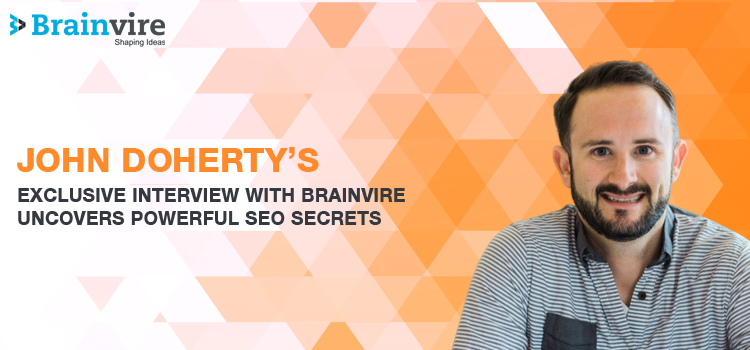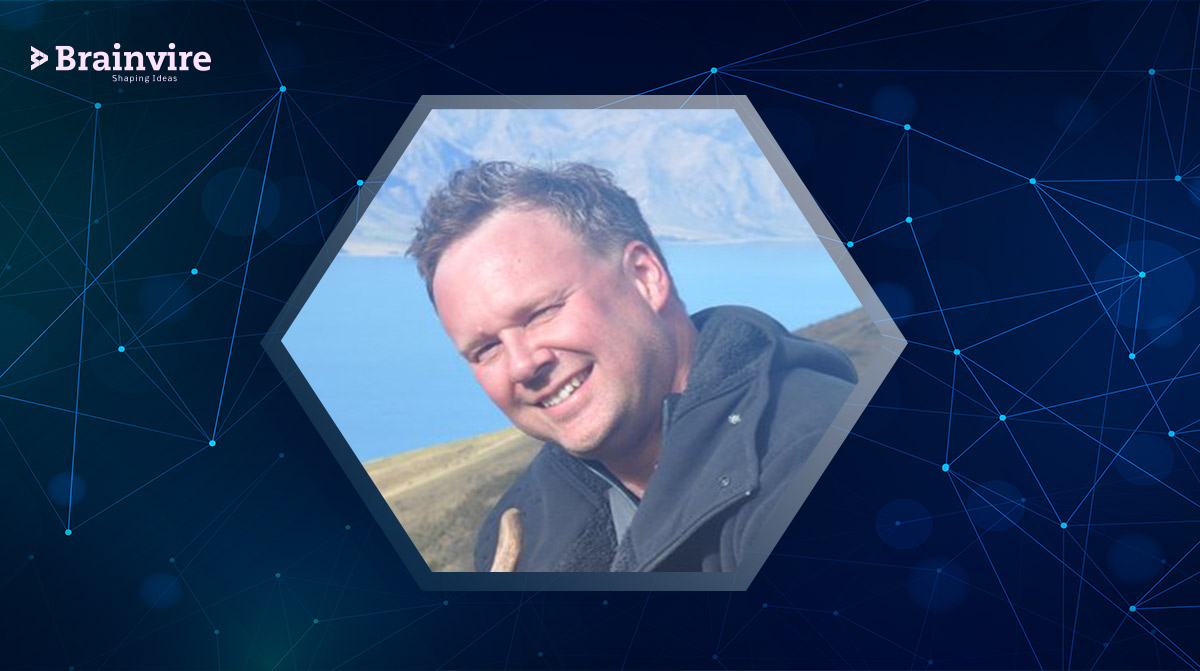John Doherty is the founder of Credo, which is a service that connects businesses with the right marketing provider to help them grow. He is an international speaker and a well-known blogger. He has also featured in Entrepreneur, The Next Web, CNBC, Today.com, and others.

As an SEO and growth consultant, he helps marketplaces, e-commerce giants, and content sites grow through B2C customer acquisition via SEO, email marketing, and content.
1. Which SEO tools do you use and recommend?
SEO tools are a dime a dozen, but there is really only a handful that is robust and able to scale like the industry needs. I pretty much use or have used all of them, and the ones I consistently use these days are SEMrush, Ahrefs, and DeepCrawl.
2. Has the recent Google algorithm update impacted your SEO practice?
Google is always releasing new iterations of or additions onto their algorithm, which at this point is a massive beast in and of itself learning via machine learning. No recent algorithm changes in Google have affected any of our sites, and in fact, we’ve seen good gains through many of them.
I’ve always focused on sustainable SEO. We may not rank the fastest, but those rankings are going to stick for the long term.
3. How do you see the June 2019 and January 2020 Core update?
Like all of their algorithm changes, these are just continued iterations towards the same goal – to serve the content that best answers the query that searchers enter.
Both of these accomplished two things – increasing trust in the SERPs and surfacing more of Google’s own content. The June 2019 update, for example, increased the number of video results in the SERPs, which means that YouTube likely received a lot more views (and thus a lot more advertising dollars). And by suppressing many news sites that the algorithm deems “low quality”, they increase trust in the SERPs at the same time.
What’s more interesting to me is the January updates, which were met with broader pushback than usual. Google tried putting favicons for every site in the search results, which enhanced them but also served to make ads harder to see (and us more likely to click them).
It seems they’ve rolled this back because clickthrough rates on ads were not what they expected. At the same time, they de-duplicated SERPs between featured snippets and regular organic which effectively makes “Position 0”, as the SEO world has come to call it, the new Position 1. This is having and will massive knock-on effects for businesses who have invested so much in SEO over the years.
4. Are there any misleading SEO practices that people still follow?
There are still so many.
The main ones I see revolve around areas that couldn’t be baked into an algorithm. Google has the best engineers in the world working on their search algorithms, but even with that, there are still things they wouldn’t be able to bake in, like an author’s qualifications to talk about a subject.
That said, there are also things that many say are not a SEO ranking factor that I have a hard time believing are not, such as pogo-sticking back to the search results. Things like this that are easy to measure are almost definitely part of the much bigger hole, even if they are game-able to an extent.
5. What is your main checklist when you have a new SEO client onboard?
Any service company needs to understand who their ideal customer is. If you don’t, then you’ll be signing clients who churn out quickly either because you’re not getting them results or because they’re not able to pay what they need to pay to see results.
I always educate agencies and consultants to have a 15-20 minute discovery phone call when a new prospect comes across their plate. This is long enough to learn their needs and if it’s a fit for you, and short enough that if they’re not a good fit for you or you for them, you are not spending too much time with them. There’s no use spending time (and thus money) to not make money.
6. What’s the biggest mistake most SEO newbies make? How to avoid it?
I’ve seen many young/new SEOs pigeonhole themselves too early on a specific industry or type of website. In my opinion, it’s incredibly helpful long term to have a broad set of knowledge and experience and to wait for a while before going deep in an area.
The broader your knowledge, the larger your opportunity and the more able you are to see things working in other areas to apply to your own site/business/clients.
7. What’s your biggest challenge when matching clients to SEOs (or vice versa)?
My biggest challenge is that matching is easy, but too many marketers and marketing agencies have never had any sales training (and are not interested in it). This means that they are always hunting for “more leads” when they actually need to learn how to close these leads into clients by creating better statements of work and proposals and messaging themselves more professionally and accurately online.
8. What’s the toughest challenge SEO specialists face while attracting new clients?
The biggest challenge I see eCommerce SEO company facing is that a lot of prospects have been burned in the past by bad actors who overpromise and underdeliver. This then creates a culture of fear and a shrinking of budgets, when often the prospect needs to increase their budget since they went cheap the last time.
This leads to longer sales cycles and the need to build a lot of trusts quickly for the client to not pull the plug on the project again.
These are absolutely overcome challenges, but they require careful work and a process to turn them into advocates who trust you.
9. What are the top game-changing SEO trends to follow in 2020?
Honestly, there aren’t any. There are areas where web marketers have not yet invested that they should be – such as video and some of the alternative search engines to Google – but everything else we are seeing now has been in process for years IMO.
SEOs love to scream about BERT and EAT, but really these are just Google’s names for parts of the algorithm that reward readable and well-written content that is written by authoritative people and references other authoritative sites.
By hawking “top game-changing SEO trends for YEAR”, we risk perpetuating the snake oil perception that SEO has always had and that we’re trying so hard to shake.
10. Do you have any marketing tips for early startups?
The beginning of a startup journey can be one of the toughest parts. The startups I see succeed most often are those who have a product where demand is already high (creating demand is very hard), that meets a need that hasn’t been met yet, and has a great story around it.
Early startups need to focus on the following when marketing themselves early on:
- Leveraging their founding story and why they are doing what they are doing;
- Finding initial product/market so that their early customers who tried them out before the company is proven fall in love with them and promote them;
- Starting to create content to become the go-to resource for their customers and their industry, because this SEO flywheel takes time to really start turning.
11. Do you have any tips to improve the conversion rate for eCommerce sites?
eCommerce is such an interesting type of business to me. You drive the audience and then need to convert them to buyers. Just like a marketplace model, there are many steps to success along the way including visit, browse, add to cart, create an account, give payment info, shipping, and more.
Like any business, there are a lot of different levers that can be pulled to increase conversions on eCommerce sites.
First, if you don’t have much traffic coming to your site that’s an area to focus on. It sounds obvious, but I’ve seen too many eCommerce sites trying to “optimize for conversions” when they don’t have much traffic and thus any changes they try to test are going to take forever to show results (or lack thereof). Focus on your audience.
Second, speed up your site! Speed is especially important in eCommerce because people are browsing and often coming back to your site multiple times before they decide to add something to their cart. You’re competing against Amazon and other big sites, and if you can’t provide a better experience than them you will have a hard time.
Thirdly, reduce friction wherever possible. While a lot of the major eCommerce platforms do a decent job of helping you convert visitors to customers, there is third party software that can help as well such as Carthook for optimizing your conversion flow and Jilt for email marketing.
12. What technological advancements are you eagerly waiting for?
Honestly, I’m not much of a futurist. I’m a pretty pragmatic person and like to be focused on the present rather than the past or the future.
That said, I am quite excited about electric cars becoming more prevalent, popular, and affordable. Living in Colorado and being a huge advocate for the outdoors, anything we can do as a collective humanity to improve life on this planet is a net good.
13. What are your top three rules for success?
My rules for success are simple.
First, be good to others. If they need help, help them out.
Second, be curious. Instead of scoffing at something or refusing to do something because “it’s annoying”, ask why something is working and then think deeply about how you could apply it in a good way.
Third, take care of yourself. The hustle culture in the tech and marketing worlds is toxic, and you need to take care of your own mental health. I do this through meditation, frequent escapes to the mountains to ski, working set hours and not checking email in the evenings, and seeing a therapist every few weeks.
Ending Note
John Doherty’s actionable tips and tricks for enterprise SEO has helped millions to expand their knowledge base. Brainvire looks forward to collaborating with him again in the near future.
Related Articles
-
An Exclusive Interview With Ben Sailer Reveals Significant SEO Insights
Ben Sailer is the Inbound Marketing Director of CoSchedule. CoSchedule offers marketers a smart tool to manage content seamlessly. He is proficient in the field of content marketing and creates
-
An Interview with Michael Cottam on Current SEO Trends
Michael Cottam, a member of Moz and the ultimate authority in technical SEO, shared his SEO secrets, industry trends, and rules of online success with Brainvire. This exclusive interview series
-
An Exclusive Interview with Matt Diggity Reveals an Effective SEO Strategy For Any Business
Matt Diggity is the founder of Diggity Marketing, The Search Initiative, Leadspring, Authority Builders, and the Chiang Mai SEO conference. He is an SEO expert, influencer, blogger, and conference keynote



